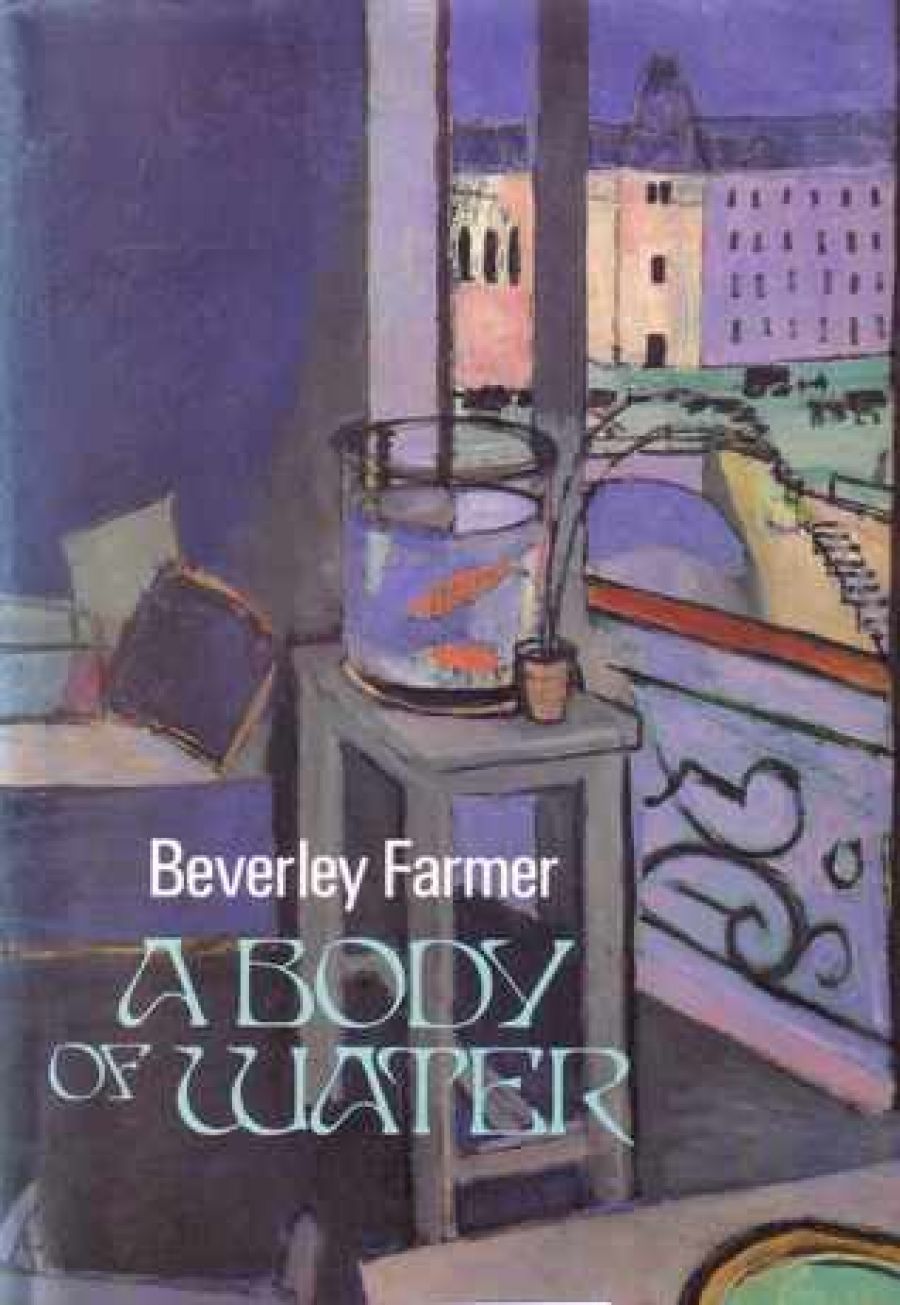
- Free Article: No
- Contents Category: Essay Collection
- Review Article: Yes
- Online Only: No
- Custom Highlight Text:
In this new book, Beverley Farmer quotes George Steiner: ‘In modernism collage has been the representative device.’ The blurb calls A Body of Water a montage. Well, it’s a difficult book to describe. It’s not a pasting together, there’s no smell of glue about it. Nor is it put together, plonk, thunk, like stones. It’s rather, in her own words, an interweaving.
- Book 1 Title: A Body of Water
- Book 1 Biblio: University of Queensland Press, 298 pp, $29.95 hb
- Book 1 Readings Link: booktopia.kh4ffx.net/oxa69
The book could easily have been a self-indulgence, as it sometimes is (though nothing like a couple of recently published Australian examples). The notebook in particular runs the risk of collecting trivia. The ordinary reader probably doesn’t want to hear about kittens making messes, nor about some more intimate human details. And dreams! Who’d be a psychiatrist, having to listen to other people’s boring dreams!
However, A Body of Water emerges as audacious and original, and it is held together on the level of land and sea by an illuminating sense of place. Her place is Queenscliff in Victoria, looking out across the rip where there are the shapes of ships in daylight and the groans of ships in fog, her constant companion a black lighthouse. She starts off from it and comes back to it, always with freshness.
The book is akin to, and has the same vividness as, some of Cyril Connolly’s work, where the basic theme is always that of writing and the writer.
Anyone who thinks that writing makes a lovely hobby ought to be made to read Farmer’s book. Its deepest interest is in the seriousness and day-and-night thinking involved in being a writer, finding the leads in the work of other writers, and all the time trying to bring the self and the world together and to understand what to make of the conjunction.
And then there are all the things that cannot be said, the torment of every writer. Farmer quotes Virginia Woolf: I see myself as a fish in a stream; deflected; held in place; but cannot describe the stream.’
Is learning to use words the study of a craft or a technique? Farmer seems to agree with Seamus Heaney, whom she quotes, that ‘craft is the skill of making’ and technique is not only all that but ‘a definition of a poet’s stance towards life, a definition of his own reality’. Both Chaucer (‘The lyf so short, the craft so long to lerne’) and Dylan Thomas (‘In my craft and sullen art’) would probably have maintained that it is the other way round. Whatever the semantics, Farmer speculates most rewardingly about what makes art out of words. The fragments of prose and poetry that set her thinking have the advantage of being extremely well chosen, and are usually of the highest quality. There is no trace of envy or carping, those familiar goblins on the Australian literary scene, in A Body of Water.
There are many good insights here into the mysterious nature of communication in literature. Some of them remind me of an occasion when a mother told me she had said to her little girl, ‘Emma, you’ve given me your cold’. ‘But Hi haven’t ghiven hit to yhou’, Emma replied indignantly, ‘Hi’ve sthill ghot hit’. A poem or story is a germ passed on that doesn’t immediately set the writer free of it.
This book came into being because in 1987, when Farmer reached the age of forty-six, she assessed the situation: ‘Not one story has achieved its being in my hands for nearly two years now.’ The situation is even worse than that confronted by Dylan Thomas in another poem:
On no work of words now for three lean months in the bloody
Belly of the rich year and the big purse of my body
I bitterly take to task my poverty and craft:
To take to give is all, return what is hungrily given ...
Farmer was worse off than Thomas, because she was on the terrible treadmill of fiction, so grimly portrayed in Auden’s poem ‘The Novelist’. (Farmer also writes poems, a number of which she prints in A Body of Water, but they are not of the standard of her prose.)
And so this book wakes from that nightmare, writer’s block, and on its first page she somewhat nervously quotes Octavio Paz: ‘Sterility precedes inspiration, as emptiness precedes plenitude. The poetic word crops out after periods of drought.’
Farmer succeeds in writing again because she (a good Australian as well as a student of Buddha) recognises emptiness and drought as part of the normal round, and because she is capable of returning what is hungrily given’. A couple of the stories are as good as her best, and the book that surrounds them is as rewarding to a reader as it is salutary to a writer.


Comments powered by CComment